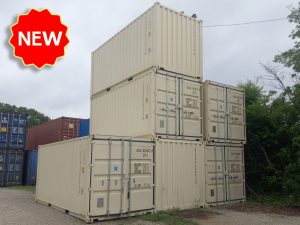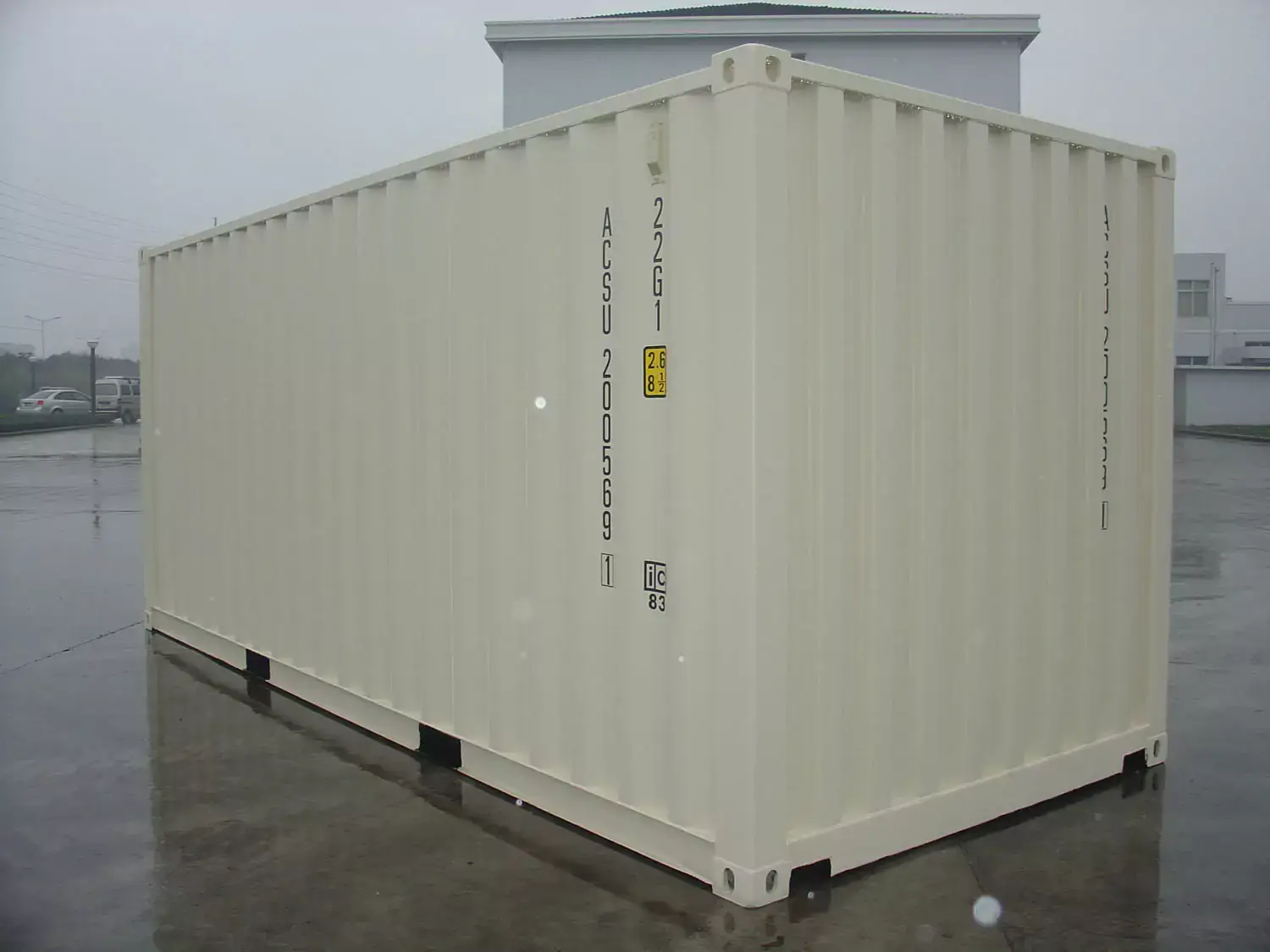Why You Should Buy New Shipping Container 40 x 8 x 9.6 for Custom Modular Designs
Why You Should Buy New Shipping Container 40 x 8 x 9.6 for Custom Modular Designs
Blog Article
The Ultimate Overview to Choosing the Right Shipping Container for Your Needs
When it concerns choosing the best shipping container, recognizing your specific needs is necessary. You'll want to consider factors like size, kind, and material to assure you make the very best choice. From common dimensions to specialized alternatives, there's a great deal to check out. Plus, budgeting for both the container and any type of adjustments can make a huge distinction. Let's damage down the essential elements to assist you discover the ideal fit for your needs.
Understanding Delivery Container Sizes
When you're picking a delivery container, understanding the various sizes offered is important for making the ideal choice. Shipping containers normally come in typical sizes of 20 and 40 feet, but you'll additionally locate various other dimensions. Understanding the size you require relies on what you prepare to shop or transport.If you're moving smaller items, a 20-foot container may be optimal, while bigger deliveries commonly need a 40-foot container. The elevation can likewise vary; high dice containers offer added upright space, which can be helpful for taller goods.Before deciding, measure your cargo, and consider exactly how much area you'll require for loading and dumping. Always consider potential future demands-- selecting a somewhat bigger container may save you hassle down the line. Eventually, selecting the best dimension will certainly enhance performance and assure your products are safe and secure throughout transportation
Kinds Of Shipping Containers Available
There are numerous kinds of shipping containers offered, each made for particular purposes and freight requirements. The common dry container is versatile, excellent for general cargo. If you're delivering subject to spoiling goods, take into consideration a chilled container, which preserves a regulated temperature. For oversized items, high dice containers supply additional elevation, suiting taller loads.If you need to carry heavy machinery or devices, level shelf containers offer a sturdy base without wall surfaces. Open-top containers enable for simple loading of high cargo, with a removable tarpaulin covering for security. If you're searching for adaptability, consider a collapsible container that can be conveniently saved when not in use.Lastly, specialized containers like tank containers are utilized for liquids, while vented containers are designed for bulk freight that requires ventilation. Recognizing your freight kind will aid you pick the ideal container to fulfill your shipping requires efficiently.
Material Factors To Consider for Resilience
When selecting a shipping container, the product plays an important function in its longevity. You'll wish to consider the benefits of steel versus light weight aluminum, especially relating to rust resistance. Comprehending these elements can aid you make a much more enlightened selection for your delivery requires.
Steel vs. Aluminum Containers
Exactly how do you select in between steel and light weight aluminum containers for your shipping requires? Start by considering sturdiness. Steel containers are durable and offer excellent toughness, making them perfect for hefty tons and severe conditions. They stand up to damages from impacts and are commonly more economical, which can be a significant element for budget-conscious buyers.On the various other hand, aluminum containers are lightweight, which can conserve you on delivery prices. They're easier to maneuver and are a great option if you require to transport products frequently. Light weight aluminum is typically extra expensive and much less durable than steel. Weigh your details requirements very carefully, including weight, expense, and the sort of freight you'll be shipping, to make the appropriate selection for your situation.
Corrosion Resistance Elements
Selecting the right material does not simply involve weight and cost; corrosion resistance plays a substantial duty in resilience. When selecting a delivery container, take into consideration the atmosphere it'll deal with. Steel containers, while solid, can corrosion if not appropriately dealt with. Try to find options with protective coverings or galvanization to enhance their life expectancy. Light weight aluminum, on the other hand, uses all-natural deterioration resistance, making it ideal for coastal locations or damp problems. It can be a lot more expensive. Furthermore, evaluate the container's use-- if it'll be revealed to chemicals or harsh climate, prioritize materials that can endure these conditions. Purchasing a corrosion-resistant container currently can save you from pricey repair work or substitutes down the line. Pick sensibly for long-term benefits.
Alterations and Customization Options
Shipping containers aren't just for delivering goods; they can be transformed to meet your particular requirements with numerous alterations and personalization alternatives. You can convert a basic container into a relaxing workplace area, a temporary retail shop, and even an individual health club. The possibilities are nearly endless.Think concerning including home windows, insulation, or air flow to improve convenience. You may also think about electric wiring, pipes, or even custom-made shelving to boost capability. If safety and security's a worry, strengthened locks can provide tranquility of mind.For aesthetic allure, you can paint the container or include an one-of-a-kind layout to make it stick out. Don't ignore floor covering options-- whether you want long lasting plywood or something more innovative, it can boost the space.Ultimately, customizing your delivery container to suit your requirements can improve usability and produce a special setting that mirrors your design.
Examining Your Transportation Requirements
When it comes to utilizing your customized delivery container, comprehending your transportation needs is crucial. Beginning by determining what you'll be shipping-- whether it's heavy tools, retail products, or personal products. Each type of cargo has different needs concerning size, weight, and accessibility.Next, consider the distance and mode of transport. Are you shipping in your area, nationally, or worldwide? This influences the container's style and capability. If you're using trucks, assure your container fits conventional dimensions for very easy loading and unloading.Additionally, think of transit conditions. Will your things require special defense from weather or temperature changes? If so, you might need insulation or air flow features in your container.Lastly, evaluate how usually you'll be delivering goods. Frequent deliveries might call for a more sturdy and versatile container to satisfy continuous demands. By dealing with these aspects, you'll be well-prepared to choose the best shipping container for your demands.
Budgeting for Your Shipping Container
Setting right here a spending plan for your shipping container is crucial for making certain a smooth buying procedure. First, determine how much you can pay for to invest. Prices can differ substantially based on dimension, condition, and type. New containers usually set you back a lot more, but utilized ones can provide significant savings.Next, consider any type of extra expenses you might sustain, such as transportation costs, distribution costs, and modifications. If you prepare to personalize the container, consider those expenditures also. Research study various distributors to compare rates and discover the best bargain that satisfies your needs.Don' t forget to consist of any type of permits or laws that might relate to your purchase and usage of the container. By plainly describing your spending plan, you'll be better prepared to make informed decisions, guaranteeing you get the best container without damaging the bank.
Maintenance and Take Care Of Longevity
To ensure your delivery container lasts for years, normal upkeep is vital. Beginning by evaluating the exterior for rust, damages, and damages. If you spot any type of concerns, address them immediately to avoid more damage. Tidy the container regularly, both in and out, to eliminate dirt, debris, and dampness that can result in corrosion.Ensure the doors secure properly and lubricate the joints to stay clear of why not look here rust and sticking. If you're making use of the container for storage, think about adding air flow to lower humidity and mold and mildew growth. For additional protection, use a rust-inhibiting paint or sealer annually.If your container's located in an extreme setting, like coastal locations, you could require to enhance maintenance regularity. Keep an eye on the flooring, also; any type of signs of wear ought to be repaired right away. With these easy actions, you'll extend the life of your shipping container substantially.
Frequently Asked Inquiries
Exactly how Do I Discover a Reliable Shipping Container Provider?
To discover a reputable delivery container vendor, beginning by looking into online reviews, asking for suggestions from good friends or sector contacts, and comparing rates. Always inspect their qualifications and assurance they supply high quality containers that fulfill your needs.

Can I Rental Fee a Delivery Container As Opposed To Buying?
Yes, you can definitely lease a delivery container instead of purchasing one. Many suppliers offer rental alternatives, which can conserve you money and provide flexibility if you just need it for a short duration.
What Allows Are Needed for Container Placement?

Are Delivery Containers Weatherproof and Appropriate for Outdoor Storage Space?
Yes, delivering containers are usually weatherproof, designed to hold up against rough problems. Their robust building maintains your things secure and dry, making them appropriate for outside storage space. Simply guarantee proper ventilation to avoid dampness accumulation inside.
Exactly how Do I Carry a Shipping Container When Purchased?

Report this page